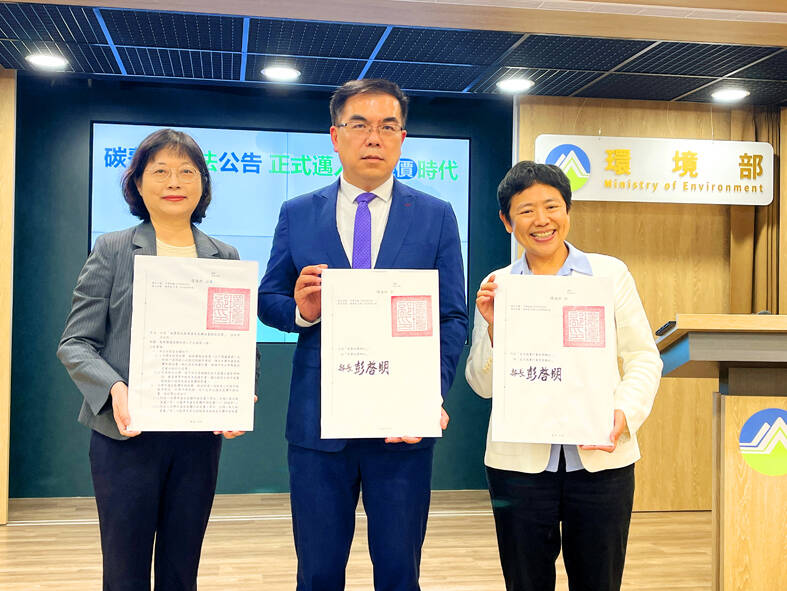The Ministry of Environment yesterday unveiled regulations governing carbon fee collection, autonomous emission reduction and greenhouse gas reduction targets for carbon fee payers in a bid to prepare industries for carbon pricing.
Fee collection would not begin until 2026, with next year to be a preparation window for fee-paying enterprises, the ministry said.
However, fee-liable businesses would still be required to report their 2024 emissions during this grace period.

Photo: Chen Chia-yi, Taipei Times
Taiwan’s carbon fee scheme would apply to 281 electric utility companies, natural gas suppliers and manufacturers who accounted for 54 percent of the nation’s total carbon emissions per year, officials said.
The criteria for paying carbon fees is ownership of an industrial facility that emits at least 25,000 tonnes of carbon a year, of which there are 500, they said.
The data are based on a 2002 industrial survey, the officials said.
The fifth carbon fee assessment and evaluation conference is to convene on Sept. 9 to set carbon rates and formalize a timetable by the end of the year, Minister of Environment Peng Chi-ming (彭啟明) said.
Companies are expected to submit emission reports starting in May next year and payments would commence the following year, he said.
The tentative schedule is designed to give enterprises sufficient time to set corporate emission reduction targets for 2030 and submit action plans to achieve that goal to the government, Peng said.
Climate Change Administration Director-General Tsai Ling-yi (蔡玲儀) said that 10 government-business conferences would be held to facilitate the adoption of reduction strategies and technologies.
Carbon fee payers may buy domestic carbon credits from voluntary reduction projects at a discount of one carbon credit for 1.2 tonnes of emissions capped at 10 percent of chargeable emissions, ministry officials said.
Enterprises not engaged in high-emission activities would be allowed to buy domestic or approved international carbon credits at a discount of one carbon credit for 1.3 tonnes of emission capped at 5 percent of chargeable emissions, they said.
Meanwhile, Taiwan Carbon Solution Exchange (TCX) chief executive officer Joshua Tien (田建中) said Taiwan’s domestic carbon credit exchange platform would launch on Oct. 2.
Tien told a forum on Wednesday that the TCX had been engaged in discussions with the ministry over the details of domestic carbon credit trading since related regulations came into effect on Aug. 15.
As a carbon fee scheme has yet to begin, the trading platform would mainly be for those planning to build new factories, he said.
Regulations announced in October last year require those setting up new factories of a particular scale and developers of high-rise construction projects to partly offset newly generated emissions by buying carbon credits from voluntary projects or implementing other offsetting measures.
Carbon credits generated from offsetting projects would be able to be sold on the platform first to buyers seeking to meet environment assessment requirements, such as construction and development projects, Tien said.
He said domestic carbon credits could be used to partly offset soon-to-be-collected carbon fees, adding that purchasing carbon credits would be better for corporate image than simply paying the fees.
Chargeable emissions would be calculated from the date the carbon fee rate is officially announced.

‘DENIAL DEFENSE’: The US would increase its military presence with uncrewed ships, and submarines, while boosting defense in the Indo-Pacific, a Pete Hegseth memo said The US is reorienting its military strategy to focus primarily on deterring a potential Chinese invasion of Taiwan, a memo signed by US Secretary of Defense Pete Hegseth showed. The memo also called on Taiwan to increase its defense spending. The document, known as the “Interim National Defense Strategic Guidance,” was distributed this month and detailed the national defense plans of US President Donald Trump’s administration, an article in the Washington Post said on Saturday. It outlines how the US can prepare for a potential war with China and defend itself from threats in the “near abroad,” including Greenland and the Panama

The High Prosecutors’ Office yesterday withdrew an appeal against the acquittal of a former bank manager 22 years after his death, marking Taiwan’s first instance of prosecutors rendering posthumous justice to a wrongfully convicted defendant. Chu Ching-en (諸慶恩) — formerly a manager at the Taipei branch of BNP Paribas — was in 1999 accused by Weng Mao-chung (翁茂鍾), then-president of Chia Her Industrial Co, of forging a request for a fixed deposit of US$10 million by I-Hwa Industrial Co, a subsidiary of Chia Her, which was used as collateral. Chu was ruled not guilty in the first trial, but was found guilty

A wild live dugong was found in Taiwan for the first time in 88 years, after it was accidentally caught by a fisher’s net on Tuesday in Yilan County’s Fenniaolin (粉鳥林). This is the first sighting of the species in Taiwan since 1937, having already been considered “extinct” in the country and considered as “vulnerable” by the International Union for Conservation of Nature. A fisher surnamed Chen (陳) went to Fenniaolin to collect the fish in his netting, but instead caught a 3m long, 500kg dugong. The fisher released the animal back into the wild, not realizing it was an endangered species at

DEADLOCK: As the commission is unable to forum a quorum to review license renewal applications, the channel operators are not at fault and can air past their license date The National Communications Commission (NCC) yesterday said that the Public Television Service (PTS) and 36 other television and radio broadcasters could continue airing, despite the commission’s inability to meet a quorum to review their license renewal applications. The licenses of PTS and the other channels are set to expire between this month and June. The National Communications Commission Organization Act (國家通訊傳播委員會組織法) stipulates that the commission must meet the mandated quorum of four to hold a valid meeting. The seven-member commission currently has only three commissioners. “We have informed the channel operators of the progress we have made in reviewing their license renewal applications, and